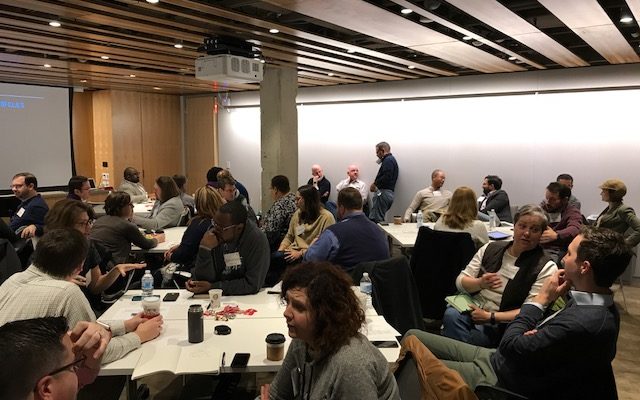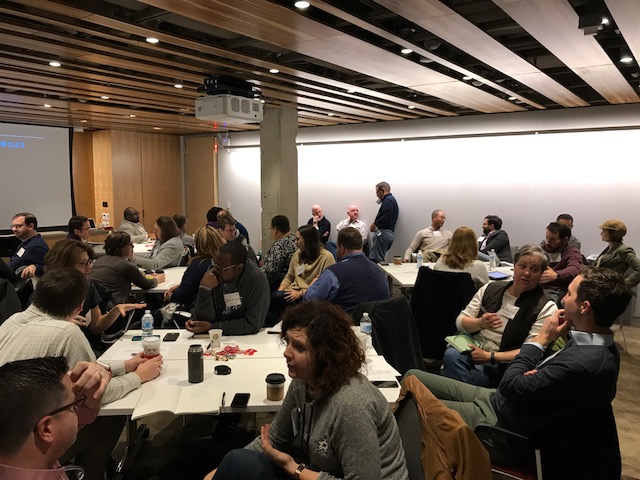A group of 35 pastors trekked to Boston in November for peer-to-peer conversations about challenges of leading congregations in today’s polarized political climate in an inaugural “Conversations That Matter” event sponsored by Baptist News Global.
Moderate and progressive Baptist pastors from diverse backgrounds and at various stages of their careers engaged in guided conversations around a theme of “Pastoral Leadership in a Politicized and Polarized America” Nov. 14-16 on the campus of Harvard University in Cambridge, Mass. Nathan Kirkpatrick, managing director of Leadership Education at Duke Divinity School, served as facilitator for the discussions.
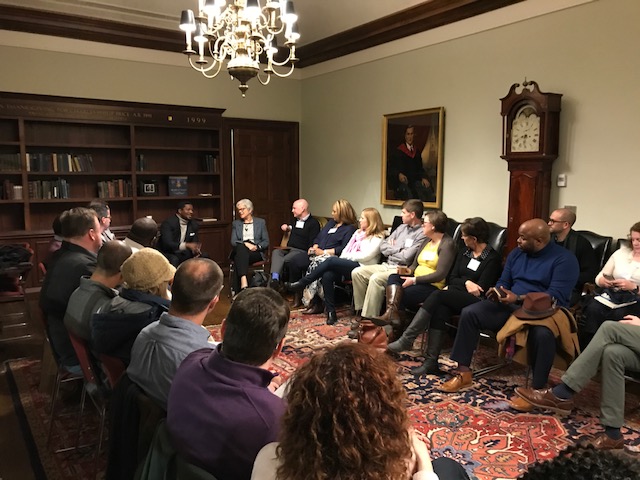 Pastors of different race, gender and sexual orientation engaged with one another on topics including how to lead faith communities in difficult conversations, balancing prophetic preaching with pastoral care and guiding congregations through intentional change while maintaining harmony.
Pastors of different race, gender and sexual orientation engaged with one another on topics including how to lead faith communities in difficult conversations, balancing prophetic preaching with pastoral care and guiding congregations through intentional change while maintaining harmony.
According to David Wilkinson, executive director and publisher of Baptist News Global, structured conversations and “immersion experiences” at area ministries centered on issues of economic justice, racial justice and sanctuary congregations/immigration concerns, but no subject was out of bounds.
“BNG’s role,” he said, “was to provide a forum for honest, peer-to-peer dialogue around some of the most difficult and often divisive issues in American religion. The objective was to facilitate the dialogue and then to listen carefully.”
“Conversations That Matter” is the brand promise of Baptist News Global, a reader-supported, online news organization formed with the January 2014 merger of the Religious Herald, a Virginia-based Baptist newspaper founded in 1828, and Associated Baptist Press, an independent news service formed in 1990.
The pilot learning event aimed to build networks, reinforce BNG’s role as a provider of relevant news and commentary, improve its content and generate ideas for fund-raising.
In the past both BNG and its predecessors have organized public gatherings such as award presentations and dinners at annual meetings of ministry partners including the Cooperative Baptist Fellowship, but the Cambridge event was invitation-only.
Participants were nominated, required to apply and selected by an advisory team. Most of the costs for the event were underwritten by a grant from the Eula Mae and John Baugh Foundation of San Antonio, Texas. Additional funds were provided by sponsors who offset travel costs for the participants.
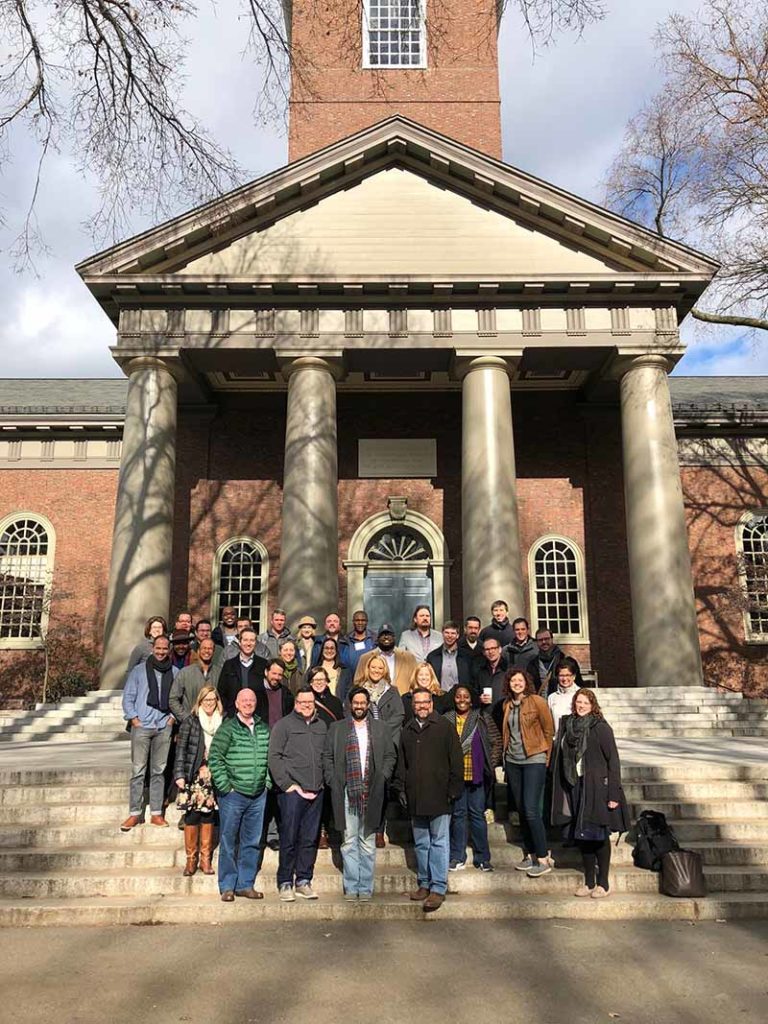
Participants: Matthew Tennant, Brent Bowden, Jonathan Brooks, Lauren Efird, LaTonya Penny, Jake Hall, Michelle Nickens, Alex Pickens, Maria Swearingen, Erica Whitaker, Griff Martin, Timothy Peoples, Chris Aho, Anne Scalfaro, Garin Hill, Daniel Glaze, Erica Van Brakle, Barrett Owen, Garrett Vickrey, Justin Joplin, Scott Dickison, Kathy Pickett, Stephanie Swanson, Racquel Gill, Stephen Cook, Jeremy Battle, Dray Bland, Corey Fields, Brent Newberry, Cody Sanders. Leaders and chaplains: Natalie Aho, David Wilkinson, Nathan Kirkpatrick, Kyle Reese, Mitch Randall, Dorisanne Cooper, Laura Everett
Most of the pastors are in their 30s, and the oldest is 57. They minister in rural, city, suburban and urban settings in the South, Mid-Atlantic, Northeast, Midwest, Mountains and Southwest regions of the U.S. as well as Canada in churches ranging in average Sunday attendance from 30 to 1,200.
Some studied at CBF-related theology programs at Duke, Wake Forest, Baptist Theological Seminary at Richmond, Mercer’s McAfee, Baylor’s Truett and Central, while others earned master of divinity degrees from schools such as Harvard and Yale.
Kyle Reese, pastor of Hendricks Avenue Baptist Church in Jacksonville, Fla., and current chair of the BNG board of directors, joined two other mid-career pastors as “chaplains” to offer support to individual participants navigating the discussions.
Chaplain Mitch Randall, a longtime pastor of churches in Texas, Kansas and Oklahoma, said the final day of the conference alone was worth the trip.
“I have made connections I would have never made otherwise,” said Randall, now executive director-elect of the Baptist Center for Ethics. “We experienced both honesty and genuineness in a safe environment.”
The third chaplain, Dorisanne Cooper, is senior minister of Watts Street Baptist Church in Durham, N.C. She previously served 12 years at Lake Shore Baptist Church in Waco, Texas.
Participants also gave the event high marks.
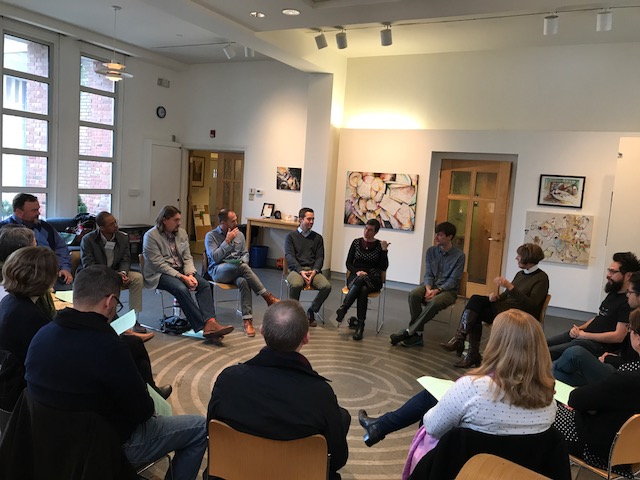 “Some of the information and opportunities to decompress and dialogue was very helpful and fruitful,” participant Racquel Gill, pastoral resident at St. Paul Community Baptist Church in Brooklyn, N.Y., said in a feedback forum after the event. “I also walked away with some new language to name some very complex issues that I see at work within my own congregation.”
“Some of the information and opportunities to decompress and dialogue was very helpful and fruitful,” participant Racquel Gill, pastoral resident at St. Paul Community Baptist Church in Brooklyn, N.Y., said in a feedback forum after the event. “I also walked away with some new language to name some very complex issues that I see at work within my own congregation.”
Garin Hill, pastor of First Baptist Church in Forest City, N.C., said he benefitted from hearing from peers with different cultural perspectives.
“I am often only with white folks (largely) from the South,” said Hill, a Virginia native who studied for the ministry at Baylor’s Truett Theological Seminary in Texas. “This was valuable.”
Erica Whitaker, senior pastor at Buechel Park Baptist Church in Louisville, Ky., said she would have appreciated greater diversity among participants and presenters.
“My clergy black brothers and sisters found themselves once again in white space as the minority,” Whitaker said. “This is discouraging to see, but I was encouraged to hear this underlining racial current rise to the surface in helpful and insightful conversation on the last day of seminars.”
“We met for holy conversation seeking together solutions to the large problems of our day,” Whitaker said. “Sitting at the table with black and white brothers and sisters who are in the trenches with me has given me hope in the midst of despair. I despair, for there is much work to be done, but I hope because I am not alone in this quest.”
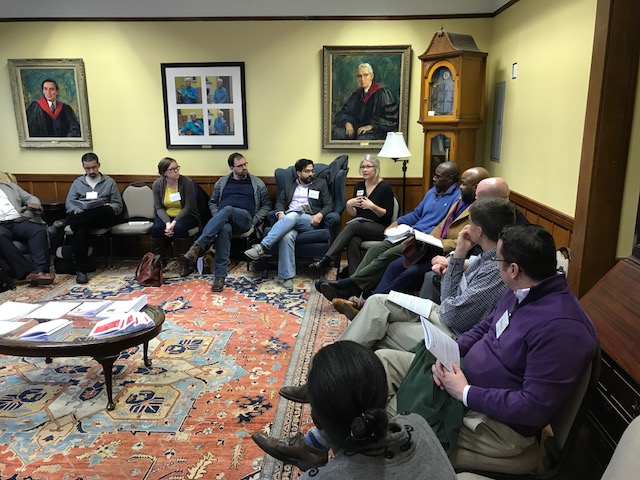 Brent Bowden, pastor of First Baptist Church of Rochester, N.Y., said being a “captive audience” allowed participants to speak freely without fear of cutting off the conversation. “It was the kind of painfully redemptive conversation that is happening scarcely anywhere these days,” Bowden reflected in a thank-you email after returning home
Brent Bowden, pastor of First Baptist Church of Rochester, N.Y., said being a “captive audience” allowed participants to speak freely without fear of cutting off the conversation. “It was the kind of painfully redemptive conversation that is happening scarcely anywhere these days,” Bowden reflected in a thank-you email after returning home
“I hope we keep doing this hard work in ways that invite our intention and our relationship-building,” Maria Swearingen, senior co-pastor at Calvary Baptist Church in Washington, added in feedback to the meeting planners. “It was blessed time that no doubt involved deep, challenging work on your part.”
Event planner Natalie Aho, BNG interactive communication specialist, described the event as “everything it should have been — messy, challenging, brave and Kingdom space.”
Aho said three days was barely enough time to scratch the surface, but she came away convinced there is a need for such conversations among Baptist clergy.
“If we can’t have honest, hard, unsolvable conversations with clergy, how do we expect our society to be less polarizing and politicized?” she asked.

